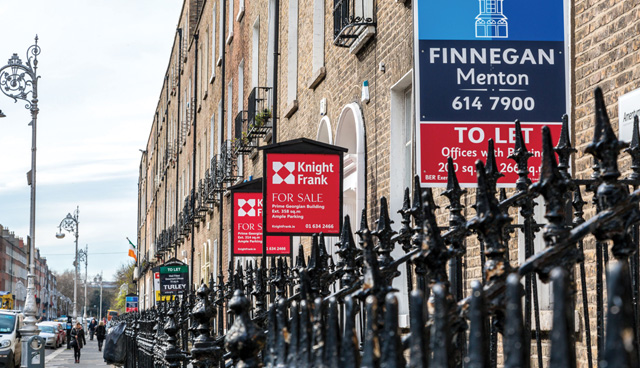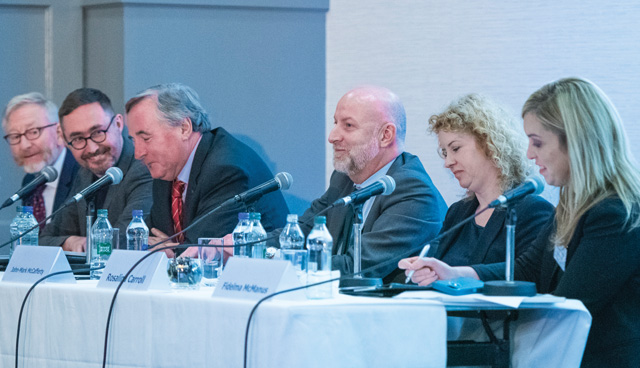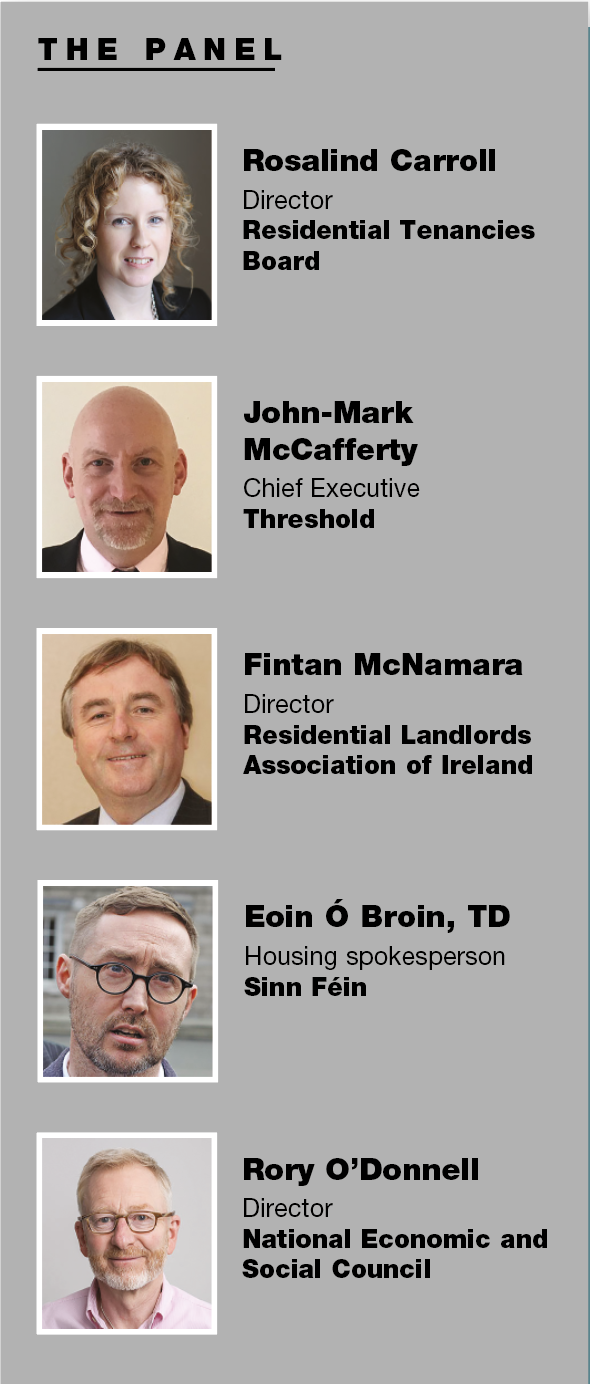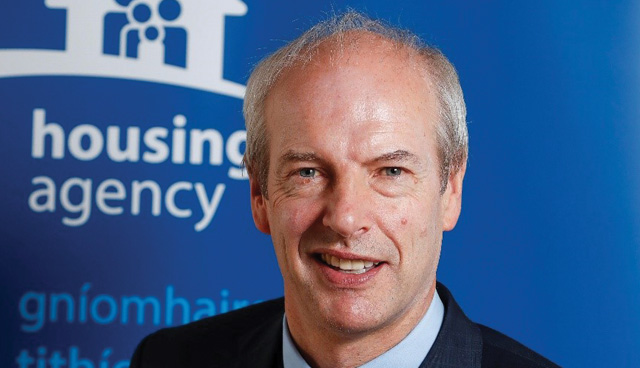
The housing market
17th May 2019
District heating: The future for decarbonising Irish housing stock
17th May 2019Creating a sustainable rental sector

(L:R) Rosalind Carroll, Residential Tenancies Board; Rory O’Donnell, National Economic and Social Council; Eoin Ó Broin TD, Sinn Féin; Panel Chair, Fidelma McManus, Beauchamps; Fintan McNamara, Residential Landlords Association of Ireland; and John-Mark McCafferty, Threshold.

(L:R) Rosalind Carroll, Residential Tenancies Board; Rory O’Donnell, National Economic and Social Council; Eoin Ó Broin TD, Sinn Féin; Panel Chair, Fidelma McManus, Beauchamps; Fintan McNamara, Residential Landlords Association of Ireland; and John-Mark McCafferty, Threshold.
eolas magazine hosted a panel discussion with key stakeholders in the housing sector around improving the model for private rental in an era of increasing demand.
According to figures produced by the National Economic and Social Council (NESC), 65 per cent of unskilled 35 to 44-year-olds in Ireland were owner-occupiers back in 1991. However, by 2011 this had fallen to 49 per cent. For professional 35 to 44-year-olds, the fall was from 91 to 80 per cent. The proportion of lone parents renting has increased from 10 per cent in 2002 to 23 per cent in 2011.
Sinn Féin’s housing spokesperson Eoin Ó Broin believes that private renting in Ireland must be driven by landlords who care about their tenants and who want to see fair play from both parties’ point of view.
“Simply viewing the ownership of a rental property as an exercise in asset management is wrong,” he says. “Many landlords have recently left the sector. A significant proportion of these may well have entered the sector on the back of the tax breaks made available around the time of the financial crash but we have moved on from there.
“I am aware that many landlords now want changes to legislation that will make it easier for them to manage the asset value of their properties.
“On the one hand they want many of the tax breaks available to landlords in the commercial sector but on the other hand they want government recognition of a status that treats them in their unique ways.
“A case in point is a desire to sell-on their properties tenant-free. This will obviously enhance the value of their houses at times of sale but these same people conveniently overlook that it is standard practice for landlords in the commercial sector to sell-on properties with tenants in situ. Private landlords can’t have it every way.”
Ó Broin continues: “We need a vibrant rental sector in Ireland. This includes both social and private working in harmony. At the moment the private rental sector is pretty dysfunctional. Private renting is the weakest component of the Rebuilding Ireland strategy. This needs to change.
“There is an obvious need for the development of tailored financial packages that will support families and individuals that have incomes above the current social threshold but cannot afford to buy their own homes.
“The issuing of vacant possession order to quit by private landlords is the biggest cause of homelessness in Ireland today.
“This practise is causing tremendous distress for families and this is why Sinn Féin is promoting legislation that will bring about change in this regard.”
Fintan McNamara, Director of the Residential Landlords Association of Ireland, says that private sector landlords are seeking to play an important and balanced role with the rental sector.
“I can cite numerous examples of landlords who have not increased rents for many years. This is because they have a very strong working relationship with tenants over many years.
“However, these same people must be provided with a fair opportunity to seek a realistic increase in the rents they obtain, should former tenants decide to move on.”
McNamara admitted that many private sector landlords included the potential to grow the asset value of properties as a central tenet of their business plans.
“Many landlords feel that, in the past, they have not had a fair hearing by government. This is why the landlords’ association was established in the first place.”
He adds: “Government must provide a fair playing field for private sector landlords. A case in point is the threat of landlords being exposed to a €15,000 fine if they strive to secure a rent increase.
“We also need to see changes with regard to the current Property Tax and PRSI arrangements, where the private rental sector is concerned.”
McNamara points out that 90 per cent of Irish homes were managed under private rental agreements at the beginning of the 20th century.
“Rental properties must not be made into asset lockers that simply form part of their owners’ business plan.
— John-Mark McCafferty, Chief Executive of Threshold
“I firmly believe that the desire for many families to have their own homes must be facilitated but there is also a need for a sustainable private rental sector in 21st century Ireland.”

McNamara confirms that many private landlords have left the rental sector because of the operational difficulties they had incurred but adds: “The poor public image of the sector has been another factor in facilitating this trend.
“I know of many former landlords who were totally embarrassed to admit their involvement in the rental sector and this had everything to do with the toxic image of private renting. This perception must be changed.”
Responding specifically to the points made by Ó Broin, McNamara confirms that private landlords did avail of the tax breaks available to them upon acquiring rental properties 10 years ago.
“But this was more than balanced by the excessive prices paid for these houses and the benefit in kind,” he says. “It should also be pointed out that 90 per cent of private tenants in Ireland are very happy with the relationship they enjoy with their landlords.”
Rosalind Carroll, Director of the Residential Tenancies Board, says that in the world of the future, rental will be the dominant force within the housing sector. She further explains: “Traditionally, one third of the rental sector in Ireland has relied on some form of public support. This is not going to change in the short-term.
“Security of affordability is a core challenge for the rental sector moving forward. We need to change the perception that home ownership is the only end game within the housing market. Likewise, we also need to change the very negative perceptions that currently exist, where private rental is concerned.”
Carroll confirms that the Tenancies’ Board oversees a total of 340,000 tenancy agreements across Ireland. These include 110,000 in the private sector and 28,000 in the approved housing bodies (AHB) sector.
“Our sole objective is to be fair to everyone. On average, we deal with 6,000 disputes each year. Our role encompasses that of educating and informing all parties involved.”
On the subject of security of tenure, Carroll says that Ireland must move in the direction of delivering long-term security for those families and individuals renting in the private sector.
“In principle, I agree with the Cost Rental approach in this regard but it will take up to 10 years for this model to deliver a sustainable result.
“In the meantime, options such as mid-market renting must be considered. The Housing Assistance Payment scheme also has a key role to play moving forward. It should be feasible to bolt on a rent contribution scheme in order to make the principle of long-term security of tenure more attainable.”
John-Mark McCafferty, Chief Executive of Threshold says that there is room for a mix of small and large private rental ventures in Ireland but adds: “The core principle that must be adhered to is that of delivering quality homes and apartments for families and individuals who have the security of knowing that they cannot be put on to the street with little or no notice.
adds: “The core principle that must be adhered to is that of delivering quality homes and apartments for families and individuals who have the security of knowing that they cannot be put on to the street with little or no notice.
“Rental properties must not be made into asset lockers that simply form part of their owners’ business plan. Landlords must act to allow their tenants enjoy a fulfilling life within the communities they are living in. Fundamentally, this comes down to the delivery of two key principles: quality housing and affordable rents.
“Since arriving in Ireland from Scotland, I have been surprised at the paucity of ambition that exists for housing development in Ireland. As a republic, the country should be much more aspirational in the way that it delivers on the housing infrastructure provided for its citizens.”
Rory O’Donnell, Director of the National Economic and Social Council says that the NESC had assessed the issue of providing long-term security of tenure for those renting in the private sector.
“Our overwhelming view is that selling a property should not be a reason for ending a tenancy,” he explains. “Lack of tenure can act to undercut the rental security. If we are moving towards a scenario where rental, as opposed to home ownership, is to be the dominant economic driver within the housing sector then we need to see steps taken which guarantee long-term security of tenure.”
O’Donnell confirms that the Council has published a number of reports in recent years, which looked at various aspects of the rental sector in Ireland. Pointing to the benefits associated with renting, he highlights the low-entry costs, no investment risk and flexibility. In other countries, large well-managed rental sectors provide affordable housing with secure occupancy, help keep house prices low and stable, and support the economy.
“However, in the Irish housing system, renting provides less security of tenure than ownership and unpredictable rents,” he adds.
Ó Broin stresses the need for long-term solutions to the Irish housing crisis.
“The days of short-term fixes are over,” he says. “This is why I am so sceptical of an emphasis being placed on measures such as mid-market renting. We have seen too many short-term measures of this nature in the past.”
The Sinn Féin TD believes that Ireland can learn from the history of housing development in the UK.
“Britain came out of the Second World War facing a combined, economic, unemployment and housing crisis but to his credit Labour’s Nye Bevan [Appointed by Prime Minister Clement Attlee as Minister for Health, with a remit also covering housing in 1945] committed to putting in place a long-term policy for housing, which delivered a genuine benefit for the country as a whole,” he says.
“We need to implement similar thinking in Ireland, as we look to the future.”




